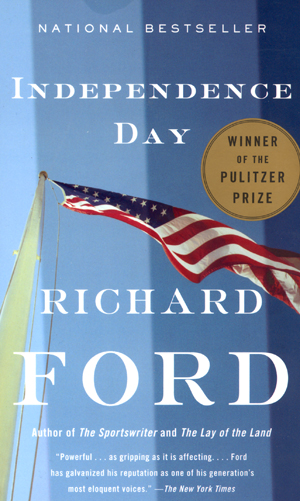
|
|
Vol. LXI, No. 42
|
|
Wednesday, October 17, 2007
|

|
|
Vol. LXI, No. 42
|
|
Wednesday, October 17, 2007
|

|

|
Most people seem to suffer from an almost superstitious reluctance to simply throw away books they no longer have any use for — an admittedly sweeping generalization based on almost 20 years of sorting and pricing volumes donated to the Princeton Public Library. The annual sale that begins October 19 will provide a Community Room full of tables filled with evidence of how generously Princetonians and others have responded to the call for donations. The quality and range of the stock reflects the quality and range of the community. The other side of the story is that you could probably fill two community rooms with books that should have been disposed of elsewhere.
The screening of donations also brings daily sightings of new books, more often than not best-sellers. These are the Vast Legions of the Unread (and Never Opened). It’s easy to identify the partially read; they’re the ones with the dust jacket flap marking the point at which the reader gave up, usually somewhere around or before page 30. Of course reader interruptus may have nothing at all to do with the content or quality of the book. It could be the result of anything from death to an unexpected crisis or a sudden shift in one’s fortunes. I was rereading Dostoevsky’s The Idiot when my father died. I hope to get back to it, but that was 20 years ago.
Somewhere in the late 1980s I gave up halfway through Richard Ford’s The Sportswriter for reasons I can’t remember. Now I’m curious to take it up again because I’ve just finished reading and admiring Independence Day, which I turned to immediately after reading and admiring The Lay of the Land, the last volume in the Frank Bascombe trilogy. This particular reading experience began last March when I was asked to write a brief introduction for the program marking the author’s upcoming November 30 appearance at the Friends of the Princeton Library’s Annual Meeting. When I said that I didn’t know Ford’s work, it was pointed out to me that I didn’t have to be a fan to write a few words about his career. A day or two later when I was sifting through a stack of donations, virtually everything Ford had written turned up, including a brand-new hard cover copy of The Lay of the Land that had clearly been read not only past page 30 but all the way to the end.
How We Read
I started reading the new Ford back in April, figuring to review it if it held me and if I liked it. Had I been a full-time book reviewer with a tight schedule, I never would have finished it. Worse, I might have skimmed it in order to meet a deadline. If you’re a writer, you don’t want to know what happens when (or if) a busy reviewer picks up your book. It doesn’t matter whether you’re an unknown or a star with an audience, you’re at the mercy of a host of impediments, prejudices, time-constraints, and issues of professional expediency. That’s no way to read a book. Reviewers who toss something aside because they don’t like the voice or the situation or maybe find the jacket copy off-putting (as jacket copy often is) may be passing up something splendid waiting for them on the other side of page 30.
I had the luxury of living with The Lay of the Land and Independence Day for the better part of five months. Almost all my reading was done at bedtime with one of those handy little booklights. I read other books during this period, but I stuck with Ford, night after night, settling into the world of Frank Bascombe. Actually, it’s not a world you settle into, it’s a voice. Bascombe is a chatty fellow. It’s like meeting someone on a train, maybe you’re going clear across Canada from Montreal to Vancouver, and you start talking in the club car or, if you’re financially embarrassed, in coach. So this guy Bascombe starts hanging on your ear about being a realtor on the Jersey shore, a profession and subject in which you have little interest beyond the fact that you both live or lived in the same town in New Jersey (your Princeton being Bascombe’s Haddam). Some of the real estate small talk and on-the-job detail has you yawning, but the stranger gets your total attention and your sympathy when he talks openly and feelingly about his divorce, and how crushed he was when his ex-wife married a rich jerk and took the kids to another town and another life. Then, along about three in the morning, when the train’s somewhere in darkest Manitoba, he tells you about what happened the time he took his difficult 12-year-old son to Cooperstown to see the baseball Hall of Fame and all of a sudden you’re wide awake and the whole encounter becomes unforgettable.
In fact, the Cooperstown chapters of Independence Day made it one of the best books I’ve read this year. It’s sobering to think that I might have given up before page 50 or 100 if I hadn’t been determined to write something about Ford — and, more important, if I hadn’t read The Lay of the Land first. Reading backwards in the Bascombe saga gave the middle book a special impact.
Early Ford
I’ve also been reading Ford’s first two novels, A Piece of My Heart (1976) and The Ultimate Good Luck (1981), the latter written when he was living in Princeton. Going from Frank Bascombe’s expansiveness to the stripped-down prose of Ford’s early work is downright jarring. As Bascombe, Ford is nothing if not forthcoming. One of the qualities that makes you stick with him is his willingness to articulate his feelings. The style of the first two novels has more in common with the landscape of Hemingway’s “The Big Two-Hearted River” or Faulkner’s As I Lay Dying than it does with the business of selling houses in “Haddam” or on the Shore, not to mention the other middle class issues Frank Bascombe expounds upon. A Piece of My Heart puts the pressure on from the first sentence. The narrator in the Bascombe books lets you breathe. While I didn’t always attend to every word of the realtor’s shoptalk, both novels offered plenty of room to move around in, excellent cross ventilation, and good views. All I had to do was turn on the booklight and get comfortable.
On the question of what you may be missing when you quit reading too early, the moment in The Lay of the Land that hit me hard enough to send me straight to Independence Day didn’t come until page 395 when Bascombe’s grown son Paul lunges at his father in the guise of an embrace, knocking the breath out of him while howling “I haven’t given you a hug yet, Dad.” It’s one of those wild, explosive family moments you’re almost embarrassed to witness and what it suggests about Paul makes the Cooperstown sequence in Independence Day all the more powerful since you share with the novelist a god-like comprehension of the character’s future. What befalls father and son in and around the batting cage on the day they were to visit the Baseball Hall of Fame generates a scene that will tear a piece from the heart of any parent. The accomplishment seems even more impressive when you consider that Ford and his wife have no children.
The Lay of the Land has just been published in a Vintage paperback. The first two Bascombe books, and Ford’s other work, are also available in Vintage paperbacks.